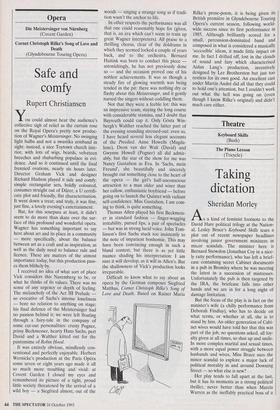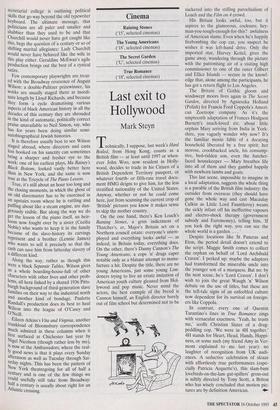Theatre
Keyboard Skills (Bush) The Piano Lesson (Tricycle)
Taking dictation
Sheridan Morley
As a kind of feminist footnote to the David Hare political trilogy at the Nation- al, Lesley Bruce's Keyboard Skills tears a plot out of recent newspaper headlines involving junior government ministers in minor scandals. The minister here is Bernard Snowdon (Jonathan Coy in a nice- ly ratty performance), who has left a brief- case containing secret Cabinet documents in a pub in Bromley where he was meeting the latest in a succession of mistresses. Unfortunately the pub is then targeted by the IRA, the briefcase falls into other hands and we are in for a long night of damage limitation.
But the focus of the play is in fact on the minister's wife (a chilly performance from Deborah Findlay), who has to decide on what terms, or whether at all, she is to stand by him. An older generation of Cabi- net wives would have told her that this was part of the job, no questions asked, all loy- alty given at all times, so shut up and smile. In more complex marital and sexual times, with a more equal power struggle between husbands and wives, Miss Bruce uses the minor scandal to explore a major lack of political morality in and around Downing Street — so what else is new?
Her play tends to fall apart at the last, but it has its moments as a strong political thriller, never better than when Marcia Warren as the ineffably practical boss of a secretarial college is outlining political skills that go way beyond the old typewriter keyboard. The ultimate message, that politicians are all paler and smaller and shabbier than they used to be and that Churchill would never have got caught like this, begs the question of a century or so of shifting marital allegiance: Lady Churchill would never have behaved like the wife in this play either. Geraldine McEwan's agile production brings out the best of a cynical satire.
Few contemporary playwrights are treat- ed with the Broadway reverence of August Wilson: a double-Pulitzer prizewinner, his works are usually staged there at inordi- nate length by Lloyd Richards, and because they form a cycle dramatising various aspects of black American history in all the decades of this century they are shrouded In the kind of automatic, politically correct praise unavailable to Neil Simon, say, who has for years been doing similar semi- autobiographical Jewish histories.
It is therefore usually best to see Wilson staged abroad, where directors and casts less hooked on his sanctity can sometimes bring a sharper and fresher eye to the work: one of his earliest plays, Ma Rainey's Black Bottom, looked vastly better here than in New York, and the same is now true at the Tricycle of The Piano Lesson. True, it's still about an hour too long and the closing moments, in which the ghost of an old slavemaster has to be exorcised in an upstairs room where he is rattling and Puffing about like a steam engine, are dan- gerously risible. But along the way we do get the lesson of the piano itself, an heir- loom now fought over by a sister (Cecilia Noble) who wants to keep it in the family because of the slave-history its carvings represent and a brother (Lennie James) who wants to sell it precisely so that the cash can save him from latterday slavery of a different kind.
Along the way, rather as though this were a black Separate Tables, Wilson gives us a whole boarding-house-full of other characters with other lives and other prob- lems, all here linked by a shared 1936 Pitts- burgh background of third-generation slave families on their way to the industrial north and another kind of bondage. Paulette Randall's production does its best to haul Wilson into the league of O'Casey and O'Neill.
Eileen Atkins's Vita and Virginia, another trunkload of Bloomsbury correspondence Much admired in these columns when it first surfaced at Chichester last year by Nigel Nicolson (though rather less by me), Is now at the Ambassadors, where the real- lY good news is that it plays every Sunday afternoon as well as Tuesday through Sat- urday nights. This has been the pattern of New York theatregoing for all of half a century and is one of the few things we could usefully still take from Broadway: half a century is usually about right for an Atlantic crossing.



























































 Previous page
Previous page